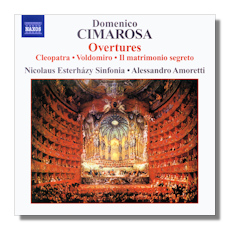
The Internet's Premier Classical Music Source
Related Links
- Cimarosa Reviews
- Latest Reviews
- More Reviews
-
By Composer
-
Collections
DVD & Blu-ray
Books
Concert Reviews
Articles/Interviews
Software
Audio
Search Amazon
Recommended Links
Site News
 CD Review
CD Review
Domenico Cimarosa

Overtures
- Voldomiro
- La baronessa Stramba
- Le stravaganze del conte
- Il matrimonio segreto
- L'infedeltà fedele
- Il ritorno di Don Calendrino
- Il falegname
- Cleopatra
- Il convito
- La vergine del sole
- Il credulo
- L'impresario in angustie
Nicolaus Esterházy Sinfonia/Alessandro Amoretti
Naxos 8.570508 DDD 69:06
As far as I know, this is the only collection of Cimarosa's overtures that is currently available, unless you count the sequel CD (Naxos 8.570279), which is performed by the Toronto Chamber Orchestra with conductor Kevin Mallon. The present CD, recorded in 2000, used to be on the Marco Polo label. It is less expensive, now that it is on Naxos.
The Italian composer Domenico Cimarosa (1749-1801) was a contemporary of both Mozart and Joseph Haydn. Stylistically, Cimarosa has much in common with those two composers, although his Neapolitan origins and education distinguish his music from theirs. In his early twenties, he composed Le stravaganze del conte (of which the overture is included here), beginning of run of more than 65 operas, ending with Artemisia, which remained unfinished at his death. His operas were extremely popular, and they bought him a ticket not just to theaters up and down the "boot" of Italy, but also to Vienna and St. Petersburg, where he wrote music for the court of Empress Catherine II.
Today, Cimarosa is remembered chiefly for the opera Il matrimonio segreto (The Secret Marriage) and an oboe concerto, in an inauthentic arrangement by Arthur Benjamin. These overtures are of no great importance, musically speaking, and apparently they have little to do with the operas they precede, but they are completely enjoyable. Tracking Cimarosa's overtures can be confusing, however. When one of his operas was performed in a different theater, sometimes he would significantly revise the overture, or compose a new one entirely. For example, according to the booklet notes by Nick Rossi and Allan Badley, there are five overtures to L'impresario in angustie (The Impresario in Distress). The overture to Il matrimonio segreto, which even was programmed by Toscanini with the NBC Symphony Orchestra, is heard here, for the first time, in a different version. The source for most of these overtures was the "S. Pietro a Majella" conservatory in Naples, with the exception of L'infedeltà fedele (Faithful Infidelity), which comes from the Bibliothèque Nationale in Paris. The overtures, all currently published by Artaria Editions, were edited by Badley (Il ritorno di Don Calendrino) and Rossi (everything else).
The Budapest-based Esterházy Sinfonia always does right with this sort of repertoire, and their playing here is bright and sympathetic. Conductor Amoretti also knows his stuff; he has conducted Cimarosa's operas in Italy, and his vivacious but relatively relaxed approach makes it easy to listen to all 12 of these overture in one go. On to Volume 2? I'm game!
Copyright © 2008, Raymond Tuttle




















